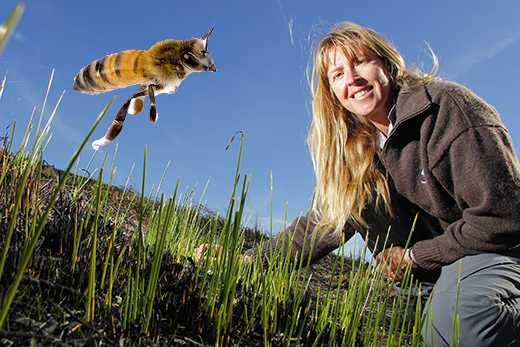The curious case of honey bees dropping dead on the Papamoa Beach shoreline has apiarists and a coastal ranger scratching their heads as to why this might be happening.
Carrington Drive resident Heather McMillan was starting her Tuesday afternoon beach walk when she came across a number of bees on the shoreline in an outgoing tide, through a bee sting.
Tauranga City Council coastal park ranger Stephanie Brackstone does not think spraying is behind bees dying on the beach.
'I got stung and my dog got stung because they were just lying wriggling in the sand,” she says.
'They were right on the shoreline and they were actually wet.”
Setting off south from Grant Place at around 3pm, Heather says the bees were spaced out every three metres and more frequent at times, and as a bee lover she became upset.
Heather recalls seeing a council sign at Wairakei Storm Water Reserve indicating spraying in recent weeks, but is reluctant to link the two together.
'I don't want to even go there, but it's a bit of a coincidence.
'I wonder if the bees have been poisoned and why they are dying in the sand.”
Returning to the beach this morning Heather says it is likely the bees have been swept out to sea following yesterday's king tide.
She is not sure whether the bees were located north of the Grant Place entrance or just concentrated to where she was walking.
Tauranga City Council coastal park ranger Stephanie Brackstone is not aware of any spraying at the reserve and says council routinely spray the 'odd plant” opposed to blanket spraying one area.
Stephanie says; 'The fact is pesticides effect invertebrates and herbicides effect plants, so it's not highly likely that the herbicide has crossed into the invertebrate membrane.
'But I do know that there are certain environmental things and events, like that king tide, bees orientate to. That would be what I'd look at.”
She says the bees are usually found in the dunes later in summer when the Muehlenbekia flowers, using it as a food source.
'I sort of see them arriving in December and staying usually till when the kids go back to school in January.”
Kaimai Range Honey owner Jody Mitchell isn't ruling out spraying of some sort, believing surfactants and oils in certain sprays can suffocate bees or hamper their breathing.
She says heading into summer there is 'quite a lot” of spraying happening and in the case of the bees on the beach, getting near the water doesn't help.
'It's a bit odd,” she says. 'Sometimes they can get disorientated and confused with sprays and stuff because it mucks with how they orientate themselves.”



4 comments
Bees and Trees
Posted on 03-10-2014 07:59 | By Disappointed
Having just admitted to being responsible for poisoning the Norfolk Pines with agrichemicals don't expect this council to be in any hurry to admit to poisoning the bees also. IMPORTANT NOTE - residents living next to the sand dunes have recently expressed concern for their own health after council approved toxic sprays have visibly devastated insect life along the coastline.
Council staff do not understand science!
Posted on 03-10-2014 14:08 | By Croaky
So Stephanie Brackstone, TCC park ranger, actually believes that herbicides only effect plants??? This just goes to show what shonky and unscientific thinking lies behind the council's implementation of their spray policy! Herbicides are highly toxic - it's why they work - and they do not necessarily differentiate between plant cells and animal cells when they do their deadly work - hence TTC's banning, a few years back (and only as the result of significant community protest) the highly toxic herbicide endosulfan, due to the dangers posed to humans and other animals alike. The council's own policy recommends "prudent avoidance" of any herbicides where there is doubt about dangers involved, however, despite the council's own Toxic Agrichemical Advisory Forum (which includes highly-qualified scientists) repeatedly reminding staff of this provision, staff continue to disregard the dangers of these chemicals and ignore TAAF's advice.
My error!
Posted on 03-10-2014 14:21 | By Croaky
Just realised I got it wrong with endosulfan - it IS a pesticide not a herbicide (it was used to kill worms). A better example is the wholesale use of roundup/glyphosate, which the council refuses to cut back on despite the mounting evidence of it's chronic toxicity (e.g. it's action as an endocrine disruptor, resulting in an increase in reproductive and developmental abnormalities, cancers such as breast and lymphatic cancers and kidney disease). Roundup/glyphosate has been banned in many countries and other countries are looking to drastically reduce and phase out its use. However, TCC council staff continue to disregard this mounting evidence provided by independent, peer-reviewed science, instead relying on the propaganda put out by the manufacturers of these chemicals!
Nothing new
Posted on 03-10-2014 20:38 | By jcgkiwi
I have seen bees on the beach many times over the years. Often seem to coincide with windy conditions... assuming the bees get blown off course and get tired...???
Leave a Comment
You must be logged in to make a comment.